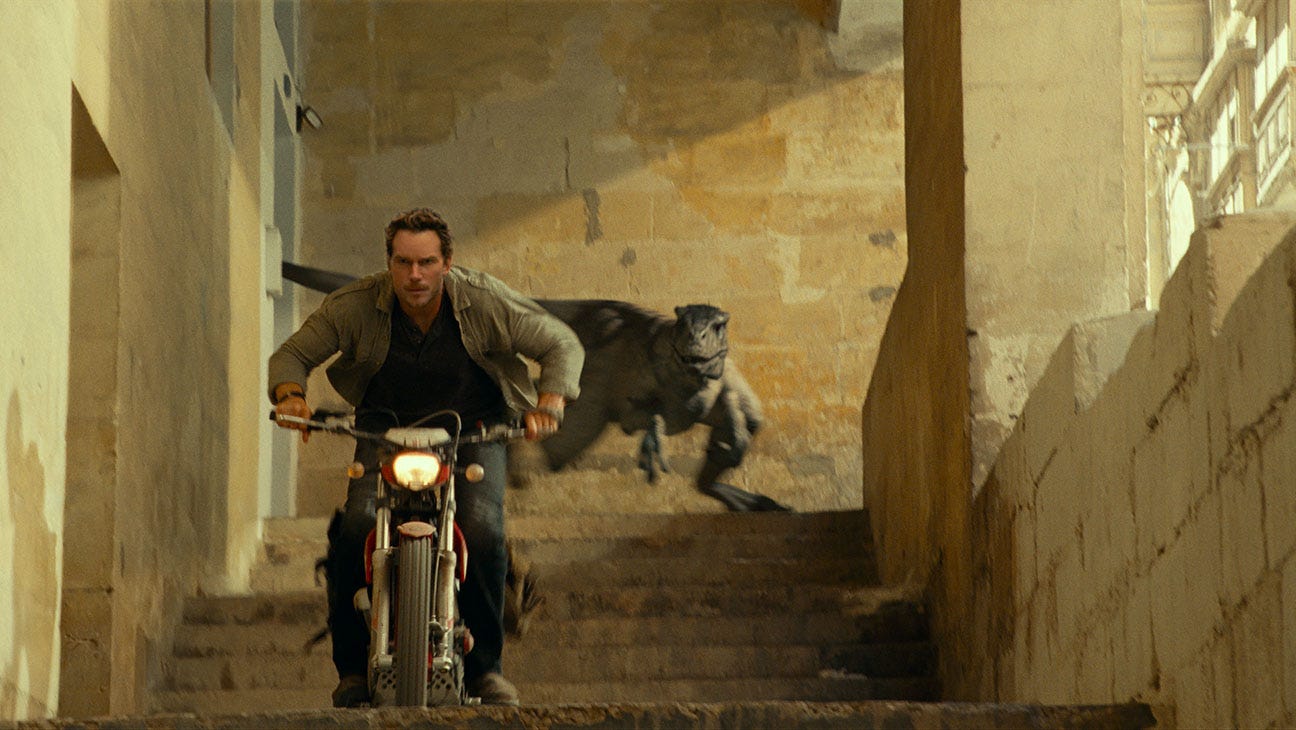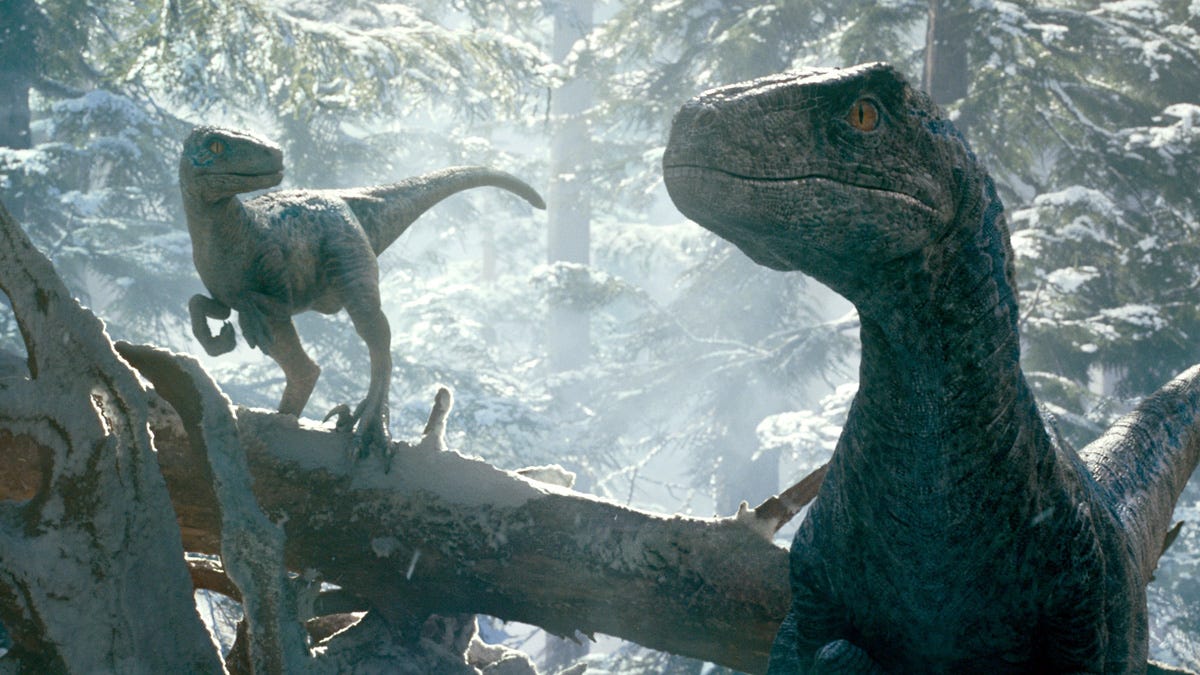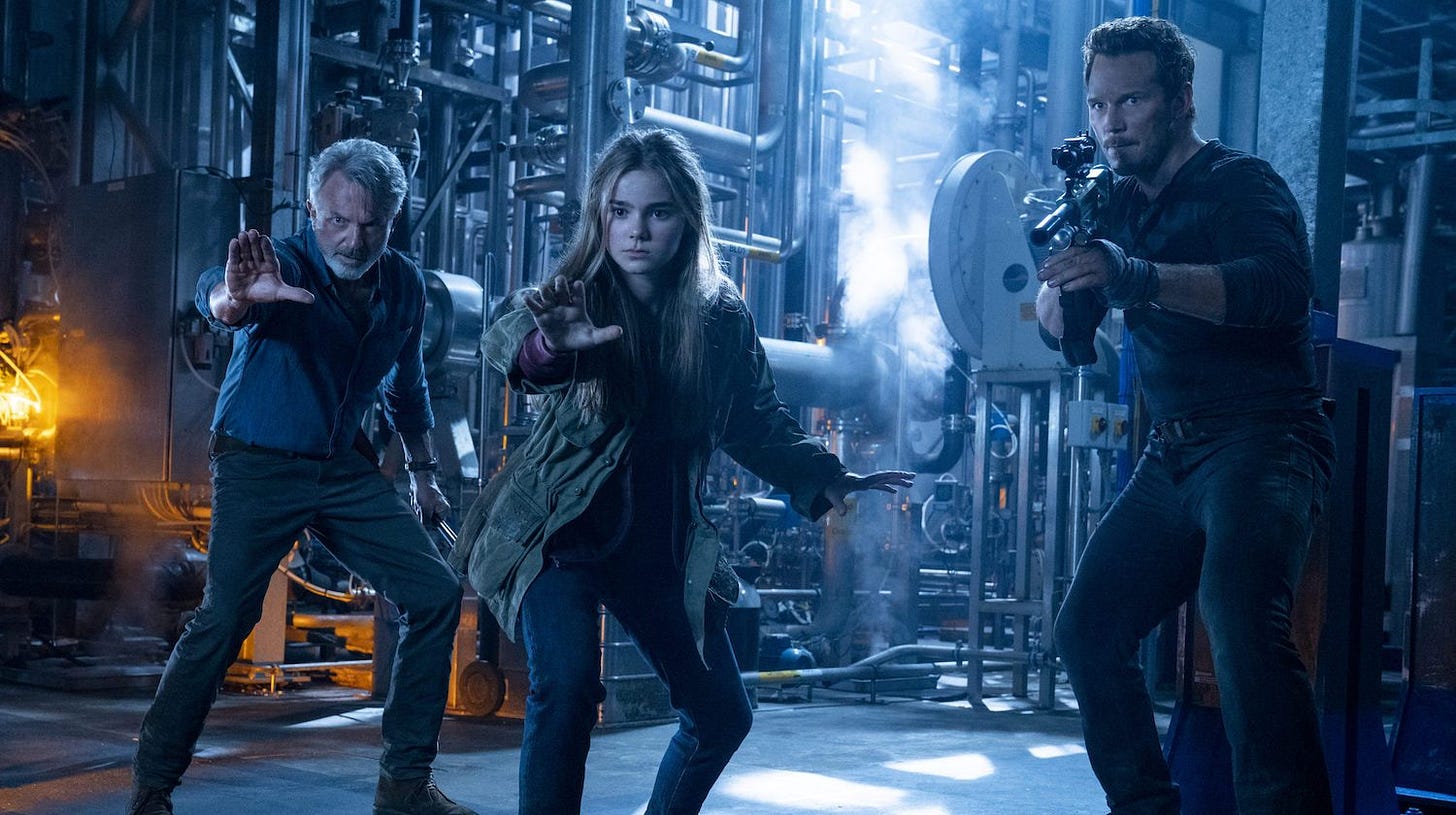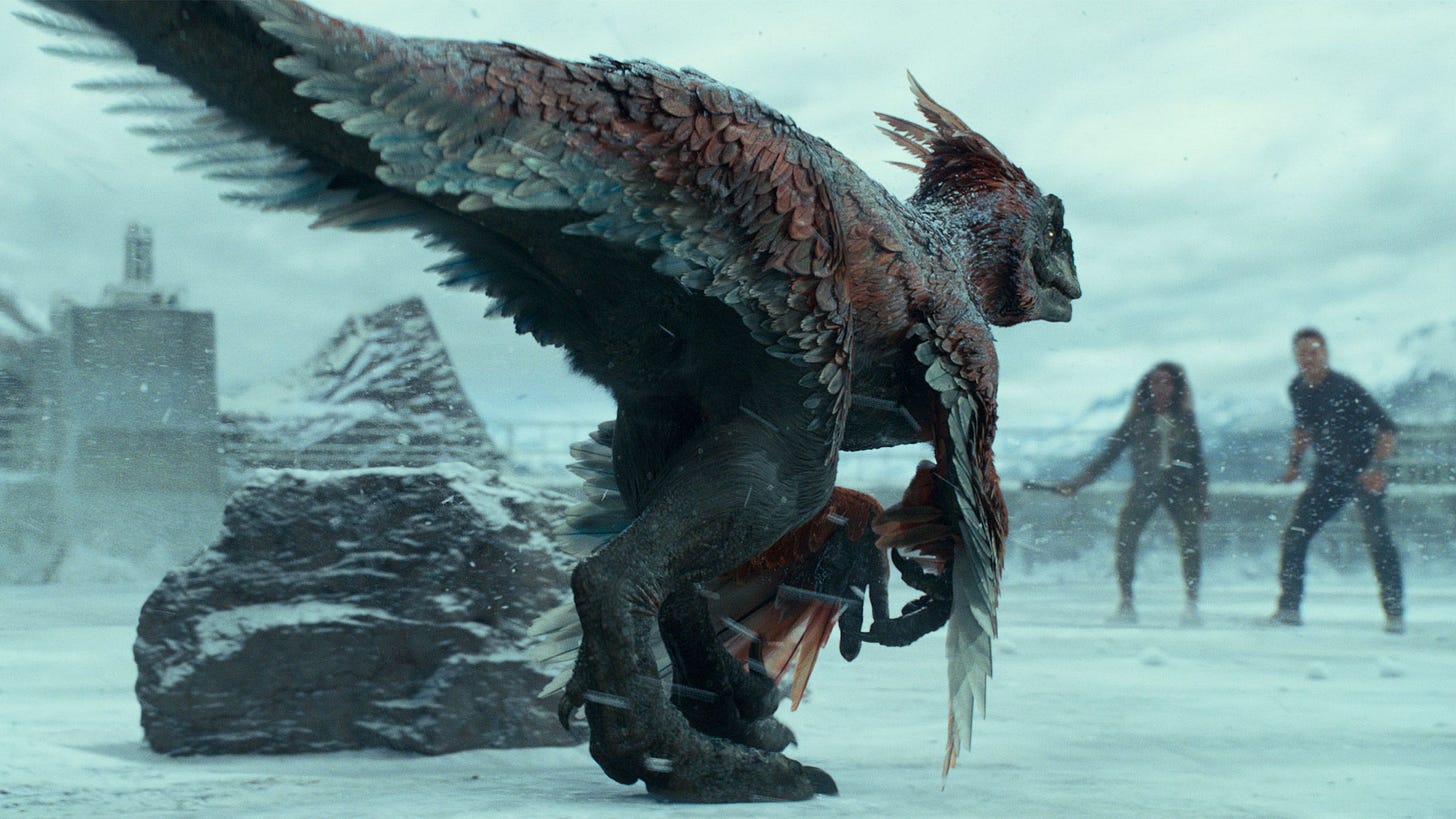I was nine years old when I sat in the theater for “Jurassic Park”, one of maybe four or five formative cinematic experiences in my life. It was the first time I was really seeing a movie about something I already loved. I grew up a little dinosaur fanatic, enough to hear about “Jurassic Park” and realize, hey, most of these dinosaurs are from the Cretaceous period, not the Jurassic (with a tidy sprinkling of Triassic creatures as well). By the time I got to “The Lost World”, I was thinking, ok, some of these guys should have feathers.
I was in prison for the release of “Jurassic World”, and I eventually saw it as one of the Institutional Movies. There were some highlights, but I hated it with nearly every fiber of my body. The main concept, ultimately, upset me a great deal. It was the notion that not only had they built the park they just spent a trilogy being told not to build, but they had determined that the general public had grown bored with dinosaurs, and InGen needed to grow new ones. The idea of being bored with dinosaurs, even as an adult, is offensive to me. Dinosaurs will never not be interesting. I was in prison trying to get back to the outside world. I did not want to find out the outside world was so cynical and imagination-free that they had grown bored with dinosaurs. Even now, I spit on this.
“Jurassic World: Fallen Kingdom” felt like it had a bit more personality than the earlier installment, but it also gets bogged down in needless subplots. It’s briefly the first film in the series to lean explicitly towards horror until a late pivot lands the franchise firmly in science fiction territory in a way that de-legitimizes the dinos. At least the film had that novel cliffhanger of a world overrun by dinosaurs, as well as the promise of more Daniella Pineda. With their intentions of beating COVID through an epic, neverending shoot, you’d have to have some positive expectations for “Jurassic World: Dominion”.
The movie begins in a post-”Jurassic” world – dinosaurs are everywhere, and people still have no idea how to deal with them. Chris Pratt’s raptor-wrangler now tries to re-direct dinosaurs on a safer path to not stray too far from their homes. Bryce Dallas Howard is no longer sweaty in high heels as she was in “Jurassic World” (to my chagrin – the thought kept me company during my times in prison) and is raising a cloned child. And, delightfully, Dr. Grant, Ellie Sattler and Ian Malcolm (Sam Neill, Laura Dern, Jeff Goldblum) are back, the fossils from the first three films now a trio of foxy elderly people. Is it believable that these three would be set off on a side quest, because they wanted the actors but had no idea what to do with the characters? Sure. Better than a cameo, specifically Goldblum’s shot-in-one-day bit in “Fallen Kingdom”.
But, uh, it’s not a side-quest, it’s the entire narrative thrust of the movie! Because it turns out the evil Biosyn (great name, v. subtle) has been using that dinosaur gene splicing technology to restore prehistoric locusts, who will then devour all crops except those belonging to Biosyn. So the main storyline of this six-movies-old dinosaur franchise involves locusts eating crops. What the hell, guys. It’s hard to make a great dinosaur movie when you have an open contempt for dinosaurs. For the record, this story strand is especially dumb because it plays out like a mystery, even though we already know Biosyn is guilty (IT’S IN THE NAME, PEOPLE). So it’s one of those Idiot Mysteries, where we have to watch characters piece together something the audience already knows, an ugly form of flattery. Why they’re still making Idiot Mysteries is it’s own Idiot Mystery. Big blockbusters, but specifically these movies, really hate their audiences, never mind their own topics.
Amusingly, “Jurassic World” mirrors the “Star Wars” trilogy made during the same era, in that the director of the first film skipped the second installment, returned for part three and undid most of what worked in the second entry. We just got to meet the clone tyke from part two which Bryce Dallas Howard adopted, fulfilling her character arc to Become Mother, and here, the kid is kidnapped by shadowy black ops. Howard and Pratt chase, leaving behind the aforementioned Daniella Pineda and Justice Smith, introduced in part two and reduced to narrative janitorial duties this time around. A new pilot is introduced played by DeWanda Wise, and Pratt has to take orders briefly from a Black woman (which provides only half the thrill of the moment in the second movie where Ted Levine calls Pineda a “nasty woman”). But aside from being fairly fierce and sexy in her brief screen time, she has little impact on the narrative. There’s even an action detour to Malta where everyone brawls with the bewitching Dichen Lachman, who seems like a gun-toting supervillain ported over from another, wilder franchise. Probably because she is – she’s a primary character in the animated spinoff series.
The end of “Fallen Kingdom” established that humans would have to cope with sharing the planet with dinosaurs. It’s a great conclusion, with a massive question mark – how will we pull this off as a species? They should have stopped there, because by the time you get to the frenetic third act of this film, the answer is clearly, “Ah, we’ll manage, more or less.” No one has begun to consider the implications of that ending, because dinosaurs mean nothing to director Colin Trevorrow and company. They aren’t biological curiosities, they’re just pixelated obstacles.
Part of the power of “Jurassic Park” is that it’s still entertaining even though you have to wait to see the dinosaurs, and when you do, it’s a bit at a time, there is suspense in how they enter and occupy the frame. CGI has changed that, and now these “Jurassic World” movies are about how many dinosaurs can wander over and cause a fuss in the hopes of monopolizing your attention. There is no suspense regarding how they’ll fill the frame – they’ll crowd it out, in fact, jumping and flying and falling and always seeming like the work of a computer jockey instead of a physical object you can touch. “Jurassic Park”, for it’s narrative flaws, is still a wonderful movie for its era, and ostensibly for today. “Jurassic World” and its sequels are just dinosaur reels, over and over. The strengths of these movies are when they focus on the dinosaurs outside of human influence, a strength this movie avoids like an allergy – one of “Dominion”’s hilarious gambles is that we’re invested in Pratt and Howard’s characters. And whenever you see the creatures, it’s too obvious that we’re watching overworked computer animators work overtime to create digital wonders that fill Trevorrow and company’s unbothered, ideologically-empty frames.
I read a lot of articles about “Jurassic World: Dominion” over its extended production, as they labored in making, and then remaking, the movie through the COVID scare. The attitude of Universal and its executives was that they had a responsibility to finish the film and release a big ticket blockbuster that could gross a billion dollars and buoy an industry that had been given a roundhouse kick from a period absent of social gathering. This idea was rightly mocked in it’s time – it even spawned its own not-very-good movie. But now, I think I find the idea of an institution with responsibilities somewhat refreshing.
I ventured from one prison to another, federal institutions all. They served to punish and brutalize me. The dearth of helpful programming was only exacerbated by COVID, which gave prisons a chance to shut down completely. I watched men with mental problems, with a loss of purpose and meaning, struggling to cope with this emptiness. People who had problems that got them sent to prison, only for these problems to metastasize. They needed counseling. They needed support. They sometimes just needed to talk to someone. They needed an institution to step up.
That’s apparently an attitude that is no longer in vogue. Near the end of my time in prison, I believe it was Mark Zuckerberg who claimed Facebook would no longer be “an arbiter of truth”, which seemed hilarious to me – shouldn’t we ALL be arbiters of truth? Shouldn’t we strive to push the truth at all times, and to shine a light when lies are told, particularly by the powerful? I would think it’s one of those “unwritten rule” deals – if there is dishonesty leading to malice, you speak up and be heard. Stand out as an arbiter of truth. Don’t give a pass to those who warp the truth to their own selfish gains. This is obvious stuff. This is the deal we make if we want to be part of a community, any community.
But now the bigger an institution really is, the less responsibilities they have compared to the average layman. Which seems a bit backwards – didn’t Spider-Man say something once about power and responsibility? Did that go over everyone’s heads when studios were paying money to create a massive multi-billion dollar franchise? If prison wasn’t going to help us, wasn’t going to provide assistance, that’s fine. But every federal institution where I stayed, they weren’t called prisons – they were called Federal Correctional Institutions (FCI’s, specifically). I would think correctional centers are where “correction” takes place, right? Or wait, am I just being a pedantic arbiter of truth?
Join me on Monday for a week of New York City Movies!









I love this article. “I spit on this.” Is my favourite part. I laughed so hard. It is the laughter of joy and agreement. I love everything you wrote in this article but I can’t stop laughing over “I spit on this.” It is a perfect level of contempt for this trilogy which I admit I quit after movie 1.